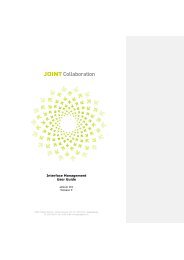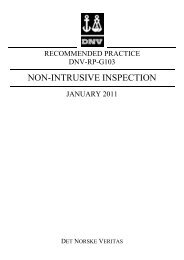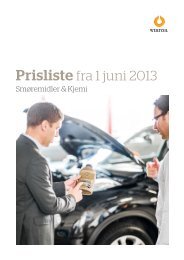Ida Ekblad MarIus Engh anawana haloba lars lauMann - Statoil
Ida Ekblad MarIus Engh anawana haloba lars lauMann - Statoil
Ida Ekblad MarIus Engh anawana haloba lars lauMann - Statoil
Create successful ePaper yourself
Turn your PDF publications into a flip-book with our unique Google optimized e-Paper software.
IDA EKBLAD,<br />
OR FOR THE NEW YEAR<br />
One and the same civilisation simultaneously<br />
produces two wholly different traditions of<br />
art, or more exactly two conflicting modes<br />
of appreciation and understanding. The first<br />
tradition is the negative one. Negative is meant<br />
here is a purely technical sense: negativity<br />
means rebellion, criticism, boldness and<br />
innovation, revolution, rejection of authority<br />
and tradition, and, ultimately, freedom.<br />
Negative refers to that initial, amazing cry of<br />
“no!” that has served as the engine for modern<br />
and now contemporary art. It is impossible to<br />
imagine the culture of modernity without this<br />
urge to reject and destroy. As Picasso so aptly<br />
expressed it:<br />
Painting is not made to decorate apartments.<br />
It is an instrument for offensive and defensive<br />
war against the enemy.<br />
There is, however, another tradition:<br />
the affirmative one. It begins with an entirely<br />
different set of assumptions. Rather than locate<br />
a target – authority, capitalism, tradition,<br />
or the law of the father – in order to negate<br />
or dismantle it, the inception is reverence for<br />
the endless, indescribable flux of all things.<br />
This approach generates both problems and<br />
paradoxes. The task of idol-smashing cannot<br />
be taken too seriously when it is known from<br />
the outset that everything, even gods and<br />
idols, will soon disappear. “Soon you will be<br />
forgotten,” Aurelius wrote, “soon all things will<br />
have forgotten you.” Measured against eternity,<br />
nothing seems to have much meaning.<br />
How, then, to create? On what grounds is one to<br />
make decisions, or function at all? The challenge,<br />
from this perspective, is to wrest something<br />
meaningful from the chaos of sensation. And<br />
if the negative tradition places hope in the<br />
future (i.e., criticism will lead to a better world,<br />
or a better self), the affirmative tradition tends<br />
instead to seek a pure present, because it is only<br />
in the present that anything is present at all; the<br />
future, as Stephen Dedalus mused unhappily, is<br />
only the past seen in a dream.<br />
<strong>Ida</strong> <strong>Ekblad</strong> belongs to this second tradition.<br />
Her work matters not because of any<br />
refinements of temperament and technique<br />
(although these are there too, in abundance)

















